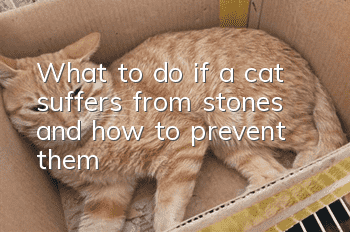What to do if a cat suffers from stones and how to prevent them

1. What should I do if my cat suffers from stones?
Please note that when you find that your cat has symptoms of stones, please send the cat to the animal hospital urgently within 24 to 48 hours to avoid regrets. As long as a cat owner is willing to spend time observing the cat's water intake, urination, and cleaning of the cat's litter every day, it will not be difficult to detect abnormalities in the cat.
When a veterinarian encounters a cat with stones, he or she will usually perform urine tests, X-rays, and abdominal ultrasounds to diagnose the cat's stone condition. Then, the veterinarian will determine the type of medical treatment, such as lithotripsy, based on the severity of the cat's stones. Surgery - Use ultrasonic shock waves to break up the stones so that the stones become smaller and easier for the cat to pass.
For cats with mild stones, the veterinarian will fill the cat with water or apply subcutaneous drips to forcefully rehydrate the cat, so that the cat can produce enough urine to expel small stones.
2. How to prevent cat stones?
Cat stones can be prevented, try following the advice provided by veterinarian Jennifer Coates:
1. A relaxing and secure environment: Try to reduce the factors that make cats uneasy, whether it is people or the environment, which will help cats relax; in addition, do not spy on cats when they go to the toilet, and do not watch them when they go to the toilet. Interference will make it feel stressed and unable to urinate properly.
2. Increase its water intake: Don’t just give your cat dry food, try giving it canned food. For cats that don’t like to drink water, owners may try adding some water to their food, changing the water basin frequently (this will help the water to be fresh and attracting the cat to drink), and purchasing an automatic water dispenser. Handy owners can also You can make homemade boiled fresh food for your cat to eat, which will help increase its water intake.
3. Careful observation every day: No amount of small steps can compare to the dedication of a cat owner. As long as the cat owner is willing to carefully observe the cat’s water intake and urination every day, and diligently clean the cat’s litter every day, it is actually very important. It is easy to detect if there is any abnormality in the cat. Once you notice anything wrong, don't hesitate to seek medical attention.
4. Dietary supplements: When cats with stones appear in their homes, foreign cat owners usually discuss with their veterinarians whether to let the cats take "dietary supplements (such as potassium citrate)" in order to lower the PH in the cat's urine. value to avoid bacterial breeding. However, this method treats the symptoms rather than the root cause. However, if your cat often suffers from stones, the cat owner may wish to discuss this suggestion with the veterinarian.
It is worth noting that the recurrence rate of cat stones is very high. Owners of cats with stones should pay special attention to their daily conditions in order to minimize the harm.
- Cat buries food
- How to treat cat dental calculus
- Performance of Siamese cats recognizing their owners
- Dangers of cat grass
- Can cow cats eat egg white?
- Early symptoms of thrombosis in cats
- What's going on with cats chanting sutras?
- Should cats vomit hairballs need to be fasted?
- How to distinguish whether feline stomatitis is viral or not
- What kind of cat is the orange cat?



